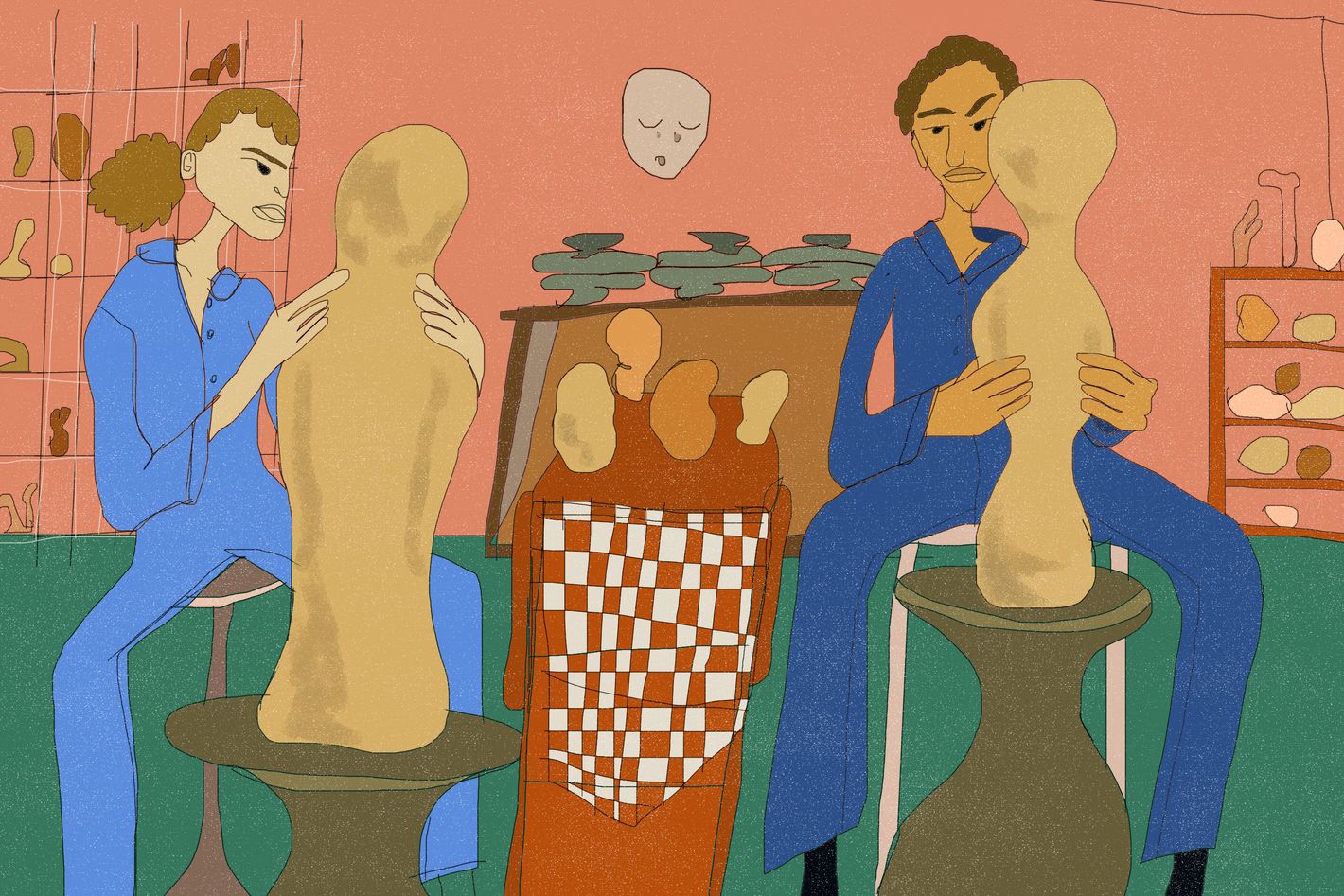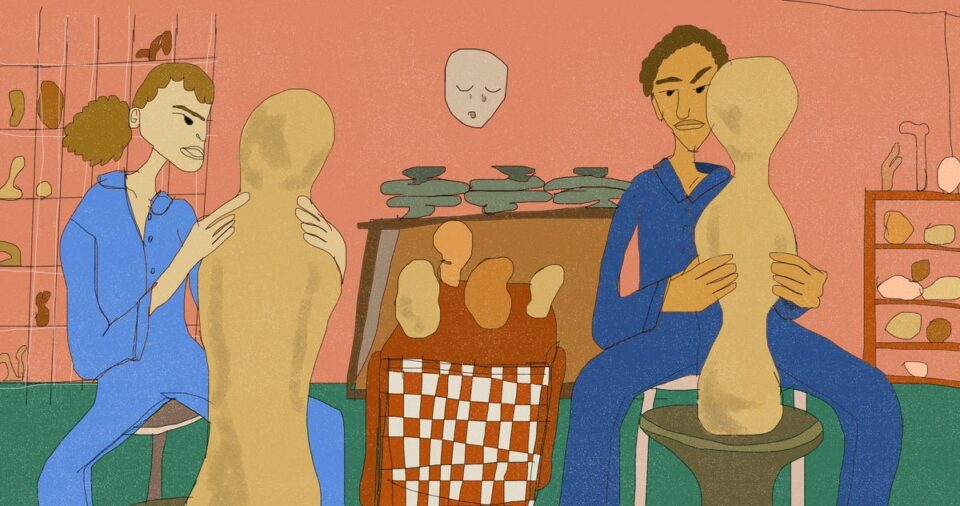
This article originally appeared in Brooding, a newsletter delivering deep thoughts on modern family life. Sign up here.
We have a remote piece of land in Vermont, about 500 meters from the Canadian border. Our neighbors have wildlife cameras set up along their property lines to monitor any foot traffic, by which they mean illegal migrants. Overhead, CBPS helicopters are routinely on patrol. The other day, my kids were playing with their friends alongside a driveway where one of these cameras is mounted, and one child was compelled — bless him — to mime a sex act for the camera. Harmless fun, one would think, except apparently this camera is linked to a live feed in one of my neighbors’ homes. Surveillance as home decor! Someone immediately appeared and told the kids to cut it out. I was shocked, but the kids were not.
Control is the spirit of our age. It’s everywhere, embedded in everything. Sometimes, we experience it as convenience, or even as amenities, like how we get to tweak our Sweetgreen and Starbucks orders until they are just right, or customize our Amazon devices so they anticipate our needs. Other times, we experience control as stats, like our step count, heart rate, the rings on our fitness trackers, our weekly phone report, or the number of books we read per year. Then there’s the control of surveillance: the Rings, the Nests, Find my Friends. It’s why I ask an app how to get somewhere I’ve been to hundreds of times, in case there might be some unexpected traffic. We buy carefully designed baby gear for the illusion of control, and we microdose on mushrooms and ketamine — ironically, a substance historically used to help us lose control — to try to enhance our performance.
Control culture starts with consumer choices, but it has bled into our expectations for how other people should behave and into how we raise our kids. We co-regulate with our children and carefully define boundaries with our friends. We control intakes and outcomes, and we hardly even notice when we’re doing it. The search for control is so complete in our lives that we take it for granted. Life feels exhausting when everyone is obsessed with maintaining control but nobody is calling it that. And parenting today is, by every measure, exhausting. How does this spirit of control come to life in our most intimate spaces?
I started thinking about control as the flavor of our culture after reading Getting Loose: Lifestyle Consumption in the 1970s, a spectacularly interesting 2007 book by the sociologist Sam Binkley. If getting loose was the ethos of much of the 1970s, what’s today’s ethos? The longer I spent considering this, the more obvious it seemed. That which was loosening in the 1970s has been contained, ordered, tightened. Whether you think it’s for the best or not, it’s hard to deny.
I have been fixated on control ever since I was an anxious kid growing up in a very loose environment. I craved order and predictability, while being taught that living a meaningful life requires some chaos. Starting at a very young age, I controlled my behavior so as to try to exert order on the erratic people around me. (Therapists really don’t like it when kids do this.) Well into my 20s, I was considered by my friends to have an overdeveloped instinct for self-control. I never went wild. I never lashed out. I couldn’t “let go” even if I tried. Control had become a habit that sometimes functioned as a prison.
But as I got into my 30s, people I met tended to think of me as easygoing and loose. My reputation — among my new friends, anyway — changed before my eyes. For a few years, I thought it was me who had changed and I was pleased with myself: See? Growth! But I’ve come to realize that I haven’t changed much at all. I still have a very hard time loosening my white-knuckle grip on my own behavior. What has changed is our shared definition of control. I was uptight as hell by the standards of the 1990s and 2000s, but I’m a relatively cool cucumber by the anxiety-spiraling standards of today.
There is a fire hose of vaguely degrading bullshit pointed at a child as soon as they emerge from utero, and it becomes a parent’s job to rake the bullshit into tidy piles for at least the next 12 years. Drowning in choices, we undertake the necessary task of parsing and organizing information, sorting the good from the harmful, and then vigilantly fortifying and defending our little territories of consumption from unwanted incursions.
In babyhood, parental control begins with the obsessive maintenance of a nontoxic environment, whatever that means to you, and it can mean anything. Food and sleep regiments have always been necessary for parents trying to work and run a household, but today’s options for controlling and optimizing your baby’s sleep have far surpassed any real utility. In toddlerhood, parents must exert control over shitty food, toys with a pre-trash-can life span of less than an afternoon, and vapid and addictive technology. Did you know that now there’s AI-generated YouTube videos for toddlers that contain no discernible human emotional content? In many cases, our obsession with control is totally warranted, and that makes it all the more depressing.
It continues into later childhood, as kids’ social worlds become further sites of optimization: safety, correct friends and activities, correct schools. When we think about raising children today, it’s often less a matter of participating in a shared family culture as 20 years of managing outcomes. There is no doubt that it’s shaping many of our personalities.
I’ve been surveilling myself for control-freak behavior since I was 6, so I’m pretty good at this kind of reflexivity. One of the things I do is what my husband calls “conversational Border collie” behavior: I herd people, unconsciously, away from conflict and even sometimes, without meaning to, away from honesty. I instinctively give people easy ways out. I invite people to take back things they said or reconsider. I like to keep everyone safe, in the conversational middle, where everything is predictable and nothing ever happens. This is one of the qualities that I most deplore in myself, and it’s also one of the hardest to shake. I am sure it has influenced the way I relate to my kids. Maybe it’s not doing them much harm, but it’s keeping me in check to an extent that feels continuous with the control-oriented world around me.
If you let control rule, it will create within you a need that will never be fully met. No place of peace will arrive. In 1995, Julianne Moore had her first leading role in Todd Haynes’s film Safe. It was billed as a creepy psychological thriller at the time. Today, the creepiness comes from how prescient Haynes was in predicting the obsessions with purity and control that underlie so much of our culture. In the movie, Moore’s character suffers from a mysterious, undiagnosable disorder that makes her hypersensitive to her environment. She ultimately seeks treatment at a retreat center run by a charlatan. She doesn’t improve, but she stays there anyway, and the film ends with her staring blankly at her reflection in the mirror, repeating “I love you” to herself.
What I really hate about the control I feel inside myself and the control I see radiating out of others is that it’s making us behave more stupidly than we actually are. It’s robbing us of the ability to think imaginatively and with sensitivity about what life is really like. Anxious parents really think that by consuming and communicating with enough intentionality, they can control their children’s future, an unharmed childhood giving way to an actualized, thriving adulthood.
But any adult who pauses to think about it knows that we always come to regret something about our past, no matter how nice our childhoods were. Part of growing up is transforming and shedding old ways of being (see my powerful desire to stop being such a conversational Border collie), even if those old ways might have involved intensive product research and nonviolent communication. When we raise our kids with too much control — of their moods, their consumption, their safety — we are making it harder for them to transform and change. We get too good at defining what it means to be safe and happy for them — definitions of which are in fact thrilling and mysterious in their expansiveness. The walls close in. No wonder parenting looks so awful to many nonparents.
It’s a consolation to accept a bit of chaos into the vacuum of control, even if this usually feels like an unwanted inconvenience. A few hours after the incident with the driveway camera, two loose dogs appeared on our land and chased the kids into the house, where they cowered behind the door while the dogs stood outside barking. They were a gray pitbull and a blond-haired puppy, both proudly un-neutered and wearing leather collars studded with spikes. While the children hid inside, the adults tried and failed to lure the dogs away so the children could get back to their football game. In rural places, most people know whose dogs belong to whom, but being city people we had no idea. Strategies were discussed: posting to the local Facebook page, calling the sheriff. Eventually, we walked down to our neighbor’s place and knocked on the door. A young woman wearing a sweatshirt with the words “Fuck it!” on the back answered. “Yeah,” she mumbled, “those’ll be Ben’s dogs. I’ll text him.”
The dogs settled into our yard and were determined not to leave. The precious sunny afternoon hours threatened to slip away with the kids indoors — not what we had intended for our much-anticipated day in the country. A fretfulness set in. Maybe they weren’t Ben’s dogs after all. Maybe Ben’s at work. But then we heard loud whistles coming from the woods, and the dogs took off back home.
More From This Newsletter
- Parenting Through Our Control Issues
- When Kids Are Addicted to their Phones, Who Is to Blame?
- Why Are Parents On TikTok So Angry?
Kathryn Jezer-Morton , 2024-04-13 14:00:53
Source link


